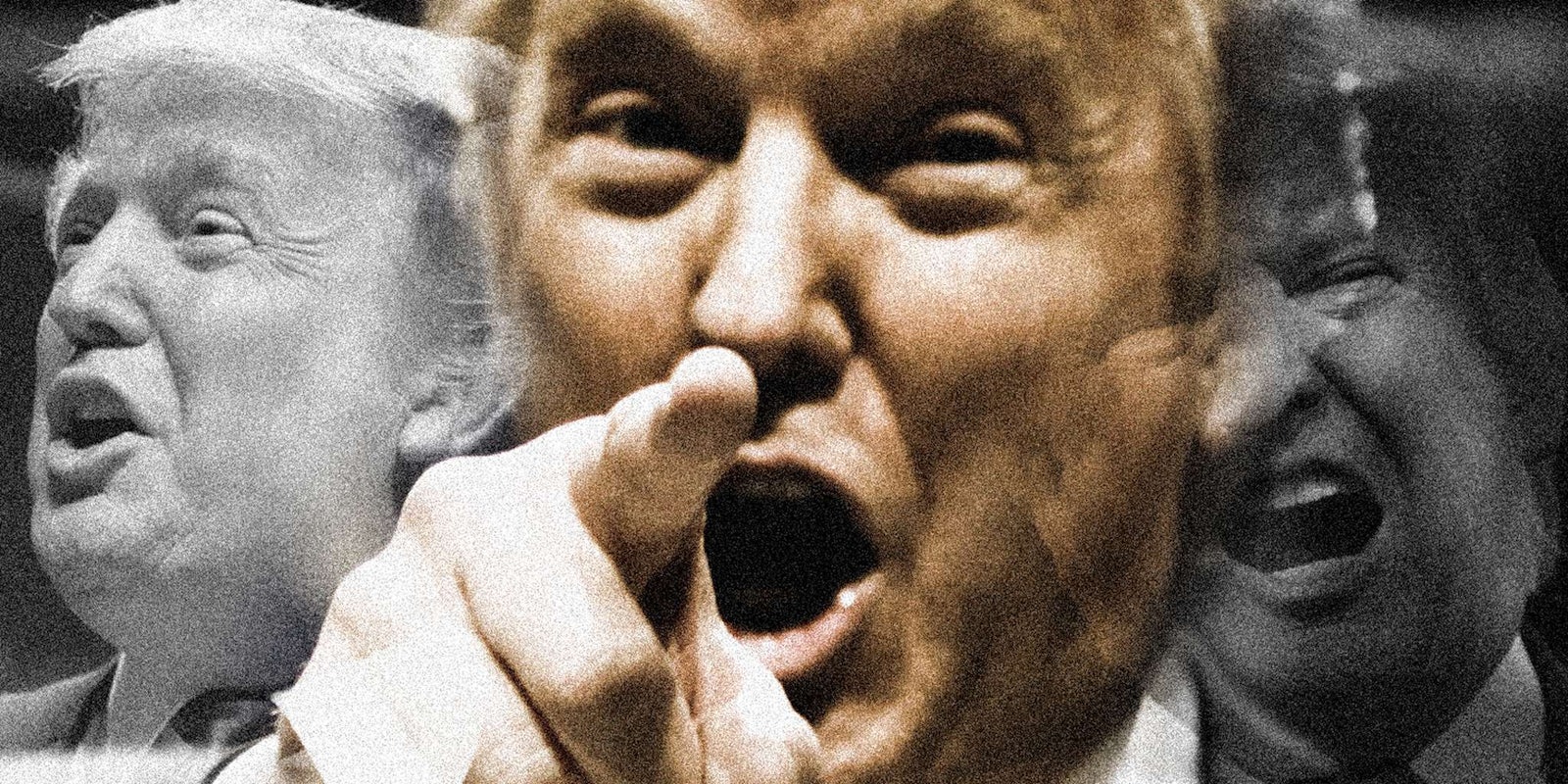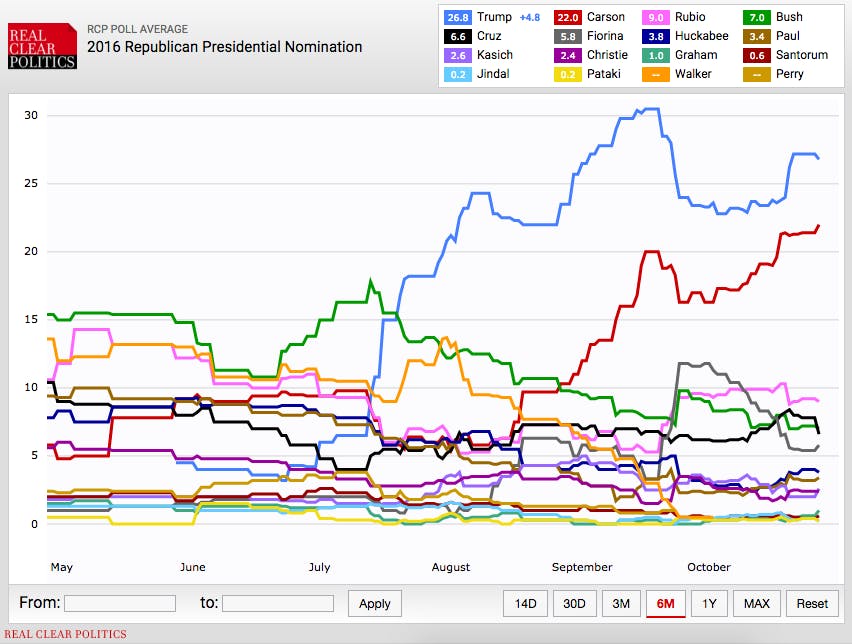Yes, it’s already that time again.
The Republican presidential contenders on Wednesday will once again crowd a far-too-small stage, this time in Boulder, Colorado, for the third Republican presidential debate, hosted by CNBC.
As with the past two GOP debates, moderators will spend an outsize amount of attention on Donald Trump, and Twitter will gleefully devour and fact-check his every soundbyte. Once again, the debate will be a two-parter, with a “kiddie table” debate featuring four candidates who meet the 1-percent minimum threshold in recent polls. The prime-time debate will include the 10 candidates who have an average of at least 3 percent in a selection of national polls.
All this sameness might give cynics a serious case of debate déjà vu. After all, it’s been only been six weeks since the last Republican debate in Simi Valley, and the line-up for the Colorado debate is almost virtually identical. The only difference is the exclusion of Wisconsin Gov. Scott Walker, who dropped out in September, which will at least give the candidates more elbow room. But worry not, a Walker-less stage is not the only thing keeping CNBC from re-airing last month’s Republican debate and hoping no one will notice.
What time is the third GOP debate and how can I watch it?
Before we cover what will be new during Wednesday’s debate, here’s the run-down on the event itself: The third 2016 GOP debate will be on Wednesday, Oct. 28. The “kiddie table” debate will begin at 6pm ET; the prime-time debate will begin at 8pm ET. You can watch the debate on CNBC, CNBC’s iOS app, Apple TV, or online at CNBC.com—but only if you’re a cable subscriber. Here’s a tip for those who don’t have cable: Sign-up for CNBC Pro for a free trial.
That’s right: Unlike the past three 2016 debates, there is no good way for anyone to livestream it.
Aside from that, you can watch pre- and post-debate shows on CNBC.com/gopdebate, which will also have a running liveblog (as will many other outlets), as well as AOL, Xfinity and Xfinity.com (for Comcast customers only), MSN, YouTube, and MSNBC’s Shift.
CNBC is promoting the hashtag #CNBCgopdebate, thought it’s likely many will just use the standard #GOPdebate hashtag.
How long will the GOP debate last?
After leading GOP candidates Donald Trump and Ben Carson threatened to boycott, CNBC caved to their demands for a two-hour debate limit and the inclusion of opening and closing statements. CNBC’s moderators for the debate (Carl Quintanilla, Becky Quick, and John Harwood) will begin the main debate by asking each candidate a single, open-ended question that each will have an opportunity to answer, according to CNN. At the end of the debate, each candidates will have 30 seconds to wrap it up with a closing statement.
A shorter event may cut down on the monotony, but not all candidates think so. Carly Fiorina questioned whether two hours will be enough, given the large number of candidates, and she lambasted the idea of canned statements.
“I mean, you know, prepared statements and set speeches are what politicians do. I think what voters want is to have candidates answer questions,” Fiorina told Radio Iowa.
A deputy Fiorina campaign manager made a jab at the other candidates for insisting on cutting the debate time.
Seems @JebBush isn’t only low energy guy! Looks like @realDonaldTrump @RealBenCarson don’t have endurance to debate @CarlyFiorina for 3hrs.
— Sarah Isgur (@whignewtons) October 15, 2015
The topic that shall not be named
It’s not Voldemort, it’s jobs and the economy! The third Republican debate will focus on the national economy, a topic that Republicans have avoided like plague in prior debates and on the campaign trail. There was nary a mention of the federal minimum wage, unemployment, or the possibility of a hike to Federal Reserve interest rates during the last debate, a fact that left many economists peeved.
Jobs
Why have Republicans avoided too much campaign talk about the economy? One reason may be that the economy is in good shape under a Democratic president. The unemployment rate for September is 5.1 percent. More than half of Americans describe the U.S. economy as “somewhat” or “very” good, according to a CNN/ORC poll released back in April. This marks the first time more Americans had a positive than a negative impression of the economy since before the Great Recession.
The two CEOs in the line-up, Trump and Fiorina, the former head of Hewlett Packard, may want to steer attention away from their backgrounds in business. Trump’s career is littered with bankruptcies and litigation; Fiorina was fired from HP, and her time at its helm saw massive layoffs. While the spotty corporate track-records of both candidates have been brought up in previous debates, it’s possible that Fiorina and Trump will face more extended questioning at Wednesday’s jobs-focused debate.
Taxes
Expect a more in-depth discussion of the Republican candidates’ plans for tax reform. Arkansas Gov. Mike Huckabee mentioned his “Fair Tax” proposal during the Simi Valley debate, but we can count on more nuanced questioning at the Boulder debate. Florida Sen. Marco Rubio‘s tax-reform plan lowers the corporate tax credit by 10 percent to 25 percent and increases the child tax credit to $2,500 per head. As an editorial about Rubio’s plan in the Wall Street Journal points out, an estimated loss of revenue due to the latter could cancel out the benefits of the former. Meanwhile, former Florida Gov. Jeb Bush‘s tax-reform plan cuts the corporate tax rate even further, to 20 percent, and consolidates the seven federal income tax brackets to three. Trump’s tax plan would reduce both individual and corporate income taxes, which the Tax Foundation estimated would reduce federal revenue by $11.98 trillion over the next decade but also increase GDP in turn by opening up opportunities for investment. Former neurosurgeon Ben Carson‘s “flat-tax” proposal is not detailed on his campaign website, but in public he has said he would call for a 10 percent flat tax rate applied to all Americans, regardless of income.
Minimum wage
The federal minimum wage is another hot topic on the campaign trail. The majority of states have raised their minimum wage past the federal minimum wage of $7.25, according to the Huffington Post. Meanwhile, Democrats in Congress introduced a bill in July to increase the federal minimum wage to $15, more than the White House-proposed increase of $10.10. A Pew Research poll from January found that 73 percent of Americans support a federal minimum wage of $10.10.
Republicans as a party are less enthusiastic about raising the federal minimum wage, though more than a majority of voters (53 percent) support doing so, according to Pew. Predictably, the 2016 Republican candidates are not in favor of raising the minimum wage. Rubio has said he doesn’t think a minimum wage law works. Trump has said he wants to keep the federal minimum wage at its current rate, adding that “having a low minimum wage wouldn’t be a bad thing for this country.” Fiorina wants states to decide their own minimum wage and get rid of the federal minimum wage completely.
Hillary Clinton’s growing shadow
Hillary Clinton had a rough couple of months, but she’s coming out of October soaring. Clinton gave a smooth performance in the first Democratic debate, with most Democrats saying she won. The pinnacle of the debate was a handshake between Clinton and Vermont Sen. Bernie Sanders, after he proclaimed that Americans have become tired of hearing about the controversy over Clinton’s use of private e-mail while at the State Department. The former Secretary of State was then questioned at a marathon hearing held by the House Select Committee on the Sept. 11, 2012, terrorist attack in Benghazi, Libya, which killed four Americans. Most political pundits seem to agree that she came out on top.
That said, the conservative machine has already revved to life in an attempt to change the Benghazi-hearing narrative. This week, Fox News host Megyn Kelly furthered Republican lawmakers’ claims that Clinton lied to the American people when she said the attack came as a result of a spontaneous protest—a point first made by the Wall Street Journal‘s Kimberly Strassel.
Emails and Benghazi have always been easy ammo for Republicans to fling at Clinton, so it will be interesting to see what else is in their quiver.
Last chance before the debt-ceiling deadline on Nov. 3
The U.S. Treasury is expected to exhaust the debt limit on Nov.3, unless Congress votes to raise the cap before then. Unfortunately for the U.S. Treasury, that might be easier said than done. The House has yet to elect a new speaker, though the expectation is that Rep. Paul Ryan (R-Wisc.) will successfully win the majority of votes on Oct. 29.
If the debt ceiling does come up on Wednesday’s debate, it could be a chance to hear candidates weigh in on the role of the president in federal borrowing. Trump said on Bloomberg TV that it was “worth the fight” for Republicans in Congress to threaten to vote against the debt limit in order to get the Obama administration to cave on spending cuts. Two of the three GOP presidential hopefuls who are in the Senate, Rubio and Kentucky Sen. Rand Paul, have regularly voted against raising or suspending the debt ceiling. South Carolina Sen. Lindsey Graham used to be against raising the debt ceiling, voted to suspend it in 2014, and has since further softened his stance.
The current standings
Once the establishment favorite, Bush has suffered a staggering downfall of support since July. The Wall Street Journal reported that support for Bush is at 7 percent in a September WSJ/NBC poll, putting him at fifth place behind Trump, Carson, Rubio and Fiorina. A RealClearPolitics average of national polls puts Paul at 3.8 percent, which would put the junior senator from Kentucky at eighth place.
Losing to a former reality show host has prompted interesting behavior from both Bush and Paul. According to CNN’s Jake Tapper, Bush said in South Carolina that he had a lot of “other cool things” to do than deal with partisan in-fighting.
Really revealing comments from @JebBush in SC today pic.twitter.com/N7M51xlR6D
— Jake Tapper (@jaketapper) October 24, 2015
Bush’s response to a Washington Post report that his campaign was in a “death spiral?” “Blah, blah, blah,” Bush said according to USA Today. “That’s my answer—blah, blah, blah.”
In a last-ditch effort to drum up some campaign buzz, Paul livestreamed an entire day on the campaign in mid-October.
During the stream, Paul addressed the fact that “Is Rand Paul running for president?” remains as a top Google Search hit. “I don’t know—wouldn’t be doing this dumbass livestreaming if I weren’t,” he said during the livestreamed video. “So yes, I still am running for president. Get over it.”
Louisiana Gov. Bobby Jindal briefly threatened to boycott the 6pm “kiddie table” debate, which he will likely appear with other underdogs former Pennsylvania Sen. Rick Santorum, former New York Gov. George Pataki, and Graham. Jindal argued that CNBC’s eligibility criteria for the prime-time debate is flawed, though it’s unlikely the network will give in to the demands of the candidate, who is currently ranked eleventh in an RealClear Politics average of national polls. Jindal has fared better in the Iowa polls, beating Ohio Gov. John Kasich and Huckabee, both who are in the prime-time debate.
Meanwhile, Carson made double-digit leads over Trump on Monday in Iowa’s Republican caucuses. The Monmouth University poll showed Carson leading Trump 32 percent to 18 percent. And for the first time, Carson led Trump nationally in a poll by the New York Times and CBS News, which found the former neurosurgeon four points ahead of the businessman.
Trump, however, remains in the lead nationally. Will Wednesday night change that? You’ll just have to watch and see.
Photo via Gage Skidmore/Flickr (CC BY SA 2.0) | Remix by Jason Reed



